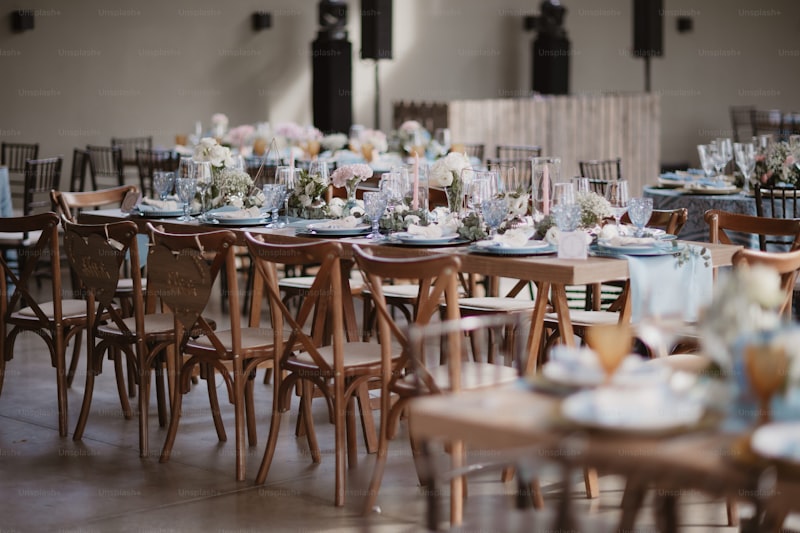Accessibility and Logistics for City Weddings: Ensuring a Flawless Celebration
Understanding the Importance of Accessibility in City Weddings
City weddings have grown increasingly popular due to their vibrant atmospheres, stunning backdrops, and abundant amenities. However, when planning a wedding in a bustling city, accessibility and logistics can pose significant challenges. This article aims to provide guidance on how to ensure that your wedding is accessible to all guests while addressing the logistical demands unique to an urban environment.
The Essence of Accessibility in Weddings
Accessibility is not just a requirement; it’s an essential aspect of Modern wedding planning. An accessible wedding venue ensures that all guests feel included and can partake in the celebration without barriers. Whether it's accommodating individuals with mobility challenges or catering to different cultural needs, accessibility should be at the forefront of your planning process.
Why Accessibility Matters
When considering accessibility for your city wedding, keep in mind several reasons why it is crucial:
- Inclusivity: A wedding is a communal event, and ensuring all guests can access the venue creates a sense of belonging.
- Legal Requirements: Many cities have laws and regulations regarding accessibility in public spaces.
- Positive Guest Experience: An accessible event will lead to happier guests and memorable experiences.
Logistical Considerations for City Weddings
Logistics can be daunting when planning a wedding in a city known for its hustle and bustle. Here are the key logistical challenges and how to navigate them effectively:
Choosing the Right Venue
1. **Accessibility Features:** Look for venues that are equipped with ramps, elevators, and accessible restrooms.
2. **Location:** Choose a venue that is near public transportation, has ample parking options, and is centrally located for ease of access.
3. **Capacity and Layout:** Consider how the venue can accommodate wheelchairs and strollers while ensuring all guests can move freely throughout the space.
| Venue Criteria | Considerations |
| Accessibility Features | Ramps, elevators, restrooms |
| Location | Public transport accessibility |
| Capacity and Layout | Space for mobility devices |
Transportation Solutions
Transportation is a critical component of logistics in city weddings. Here are some tips:
- Arrange Shuttle Services: Consider providing a shuttle service between the hotel and wedding venue to ensure smooth transitions for guests.
- Promote Public Transport: Provide maps and information for public transport options available near your venue.
- Consider Ride-sharing Options: Inform guests about local ride-sharing services for easy travel around the city.
Guest Management and Communication
For a successful city wedding, effective communication with your guests is vital:
Send Clear Invitations
Ensure your wedding invitations contain essential information on accessibility features at your venue, transportation options, and any accommodations provided.
RSVP for Special Needs
Include a section on your RSVP to inquire about any special accessibility needs your guests may have. This proactive approach ensures that you can make the necessary arrangements ahead of time.
Getting Creative with Accessibility Measures
When it comes to city weddings, creativity can help bridge the gap in accessibility:
Alternate Formats
Consider providing wedding programs in various formats, including large print or digital versions for those who may have visual impairments.
Designated Helpers
Having designated helpers for guests with mobility needs can enhance accessibility. Train a few family members or friends to assist those who require extra support.

What to Consider When Hiring Vendors
Every vendor involved in your wedding should be aware of and support your accessibility plans:
Working with Caterers
Make sure that your catering team can accommodate special diets, allergies, or food preferences that guests may have.
Photographers and Videographers
Inform your photography team of any specific accessibility needs to ensure they can capture every moment seamlessly.
Music and Entertainment
Choose entertainment that can be enjoyed by everyone. Consider options that don’t require extensive mobility, and ensure the sound setup is suitable for guests with hearing aids.
Final Touches and Considerations
As your city wedding day approaches, keep these final pointers in mind:
Pre-Event Walkthrough
Schedule a walkthrough of your venue with your wedding planner or coordinator to identify any potential accessibility challenges that need to be addressed.
Emergency Plans
Create an emergency plan for any accessibility issues that may arise on the wedding day and share it with your team.
Conclusion
Accessibility and logistics are paramount when planning a city wedding. By being proactive and considerate in your planning, you can create a beautiful, inclusive event that celebrates love and togetherness. Remember to review your accessibility checklist, communicate effectively with your guests, and work closely with your vendors to ensure a seamless experience. Make your city wedding a memorable occasion that everyone, regardless of their accessibility needs, can cherish. Don't forget to enjoy your special day!